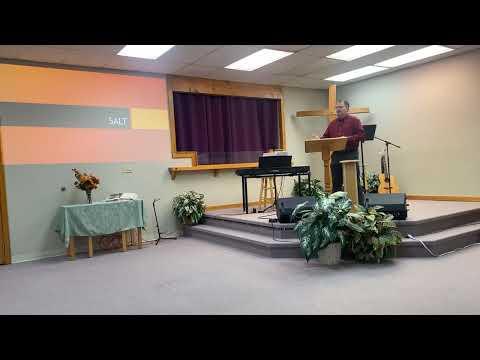Summary
Pastor Nash explores Philippians 1:3–11, focusing on themes of joy, community, and love in the context of Christian ministry. The speaker reflects on Paul’s joyous memories of the church in Philippi, comparing them to personal joyful memories, such as playful moments with a youth group. The sermon emphasizes the partnership in the gospel, noting how the church supported Paul both financially and through prayer during his imprisonment. It stresses the importance of community, prayer, and love, urging believers to abound in love with knowledge and discernment. This love is likened to the Greek word “agape,” a selfless, unconditional love akin to that of a parent for a child. The speaker cautions against false gospels and underscores the necessity of knowing God’s word to discern truth. They highlight the transformative power of the Holy Spirit, producing the fruit of righteousness within believers, as outlined in Galatians 5:22–23. The sermon concludes with a call for the congregation to boldly proclaim the gospel and grow in Christlikeness, emphasizing love, truth, and community as central to the Christian life.
Quotes
“Paul is very joyous when he thinks about the church of Philippi.”
“We enter into a new community of faith. This is what the church is.”
“Love calls for and seeks after knowledge. It is not blind.”
“Our world is a confusing and dark place.”
“Do you know God’s word well enough?”
“We ought to pray for those who are not saved.”
“We have to be working constantly and looking at ourselves.”
“He was loving, peaceful, patient, kind, good, faithful, gentle, and had self-control.”
“Let’s go forth into the community… and share the truth of Christ.”
“We don’t know who you’re going to save.”
References
- Philippians 1:3–11
- Acts 16
- Romans 10:9
- James 5:16
- Galatians 5:22–23
One-Sentence Takeaway
Abound in love with discernment, knowing God’s truth, as you boldly share the gospel’s light.
Recommendations
- Embrace joy in ministry partnerships, reflecting Paul’s gratitude for the Philippians.
- Foster a community of faith, supporting each other through prayer and encouragement.
- Cultivate agape love, mirroring Christ’s unconditional love for us.
- Seek knowledge and discernment to strengthen your understanding of God’s word.
- Guard against false gospels by deeply knowing Scripture and God’s character.
- Rely on the Holy Spirit to produce the fruit of righteousness within you.
- Engage in constant self-examination to grow in Christlikeness.
- Pray earnestly for those who have not yet encountered the saving grace of Christ.
- Boldly proclaim the gospel, trusting God to work through your efforts.
- Strive for patience and kindness, reflecting the character of Jesus in daily interactions.
- Recognize everyone as made in God’s image, deserving of love and respect.
- Encourage truth-telling that leads to healing and transformation within the community.
- Stand firm in your faith, assured of your salvation through Christ’s finished work.
- Be vigilant in recognizing and rejecting distortions of the gospel message.
- Demonstrate self-control, emulating Jesus’ strength and restraint.
- Commit to learning more about God’s word and growing in spiritual wisdom.
- Share your faith stories to inspire and uplift others within the church community.
- Pray for boldness and clarity as you witness to those around you.
- Celebrate the joy found in serving together with fellow believers.
- Reflect on personal memories of God’s faithfulness to inspire gratitude and joy.
Bible Study Notes
- Theological Points: Emphasize the interconnectedness of joy, community, and love in Paul’s letters.
- Questions: How can we better discern false teachings today? What does agape love look like in practice?
- Cross-references: Romans 12:10, Colossians 3:14, 1 John 4:7–8.
- Strong’s Concordance: Greek agape (G26) for love; koinonia (G2842) for partnership.
- Historical Background: Philippi was a Roman colony with a strong military presence, making the gospel’s message of Christ as King countercultural.
- Imaginative Lens: The image of a “fruit salad” of righteousness invites reflection on how diverse virtues interconnect and nourish the soul, akin to Lewis’s use of imagery to deepen theological understanding.
Further Study Notes
- Theological Works: C.S. Lewis’s Mere Christianity for insights on love and moral transformation.
- Literature: John Bunyan’s The Pilgrim’s Progress as an allegory of the Christian journey.
- Cultural Issues: Explore how consumerism challenges Christian love and community.
- Prayerful Reflection: Meditate on the fruits of the Spirit, asking God to cultivate them in your life.
- Moral Growth: Reflect on personal biases and strive for a deeper understanding of God’s love for all humanity.
